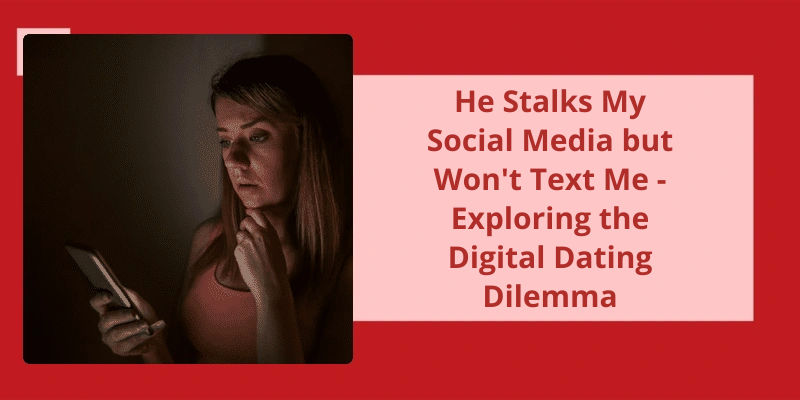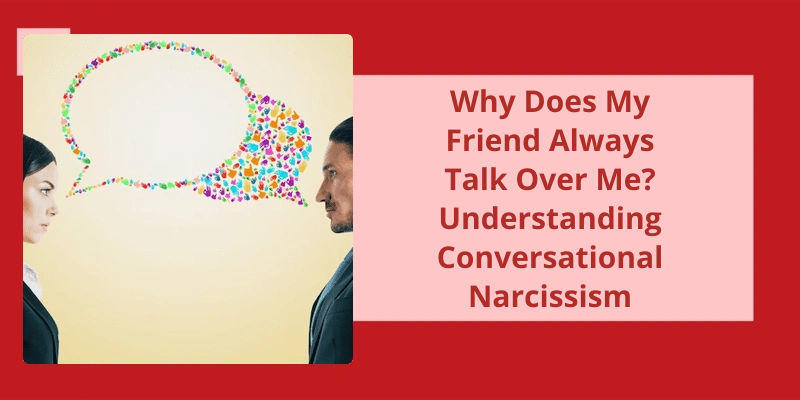In today's digital age, social media has become a ubiquitous part of our lives, allowing us to stay connected with friends and family no matter where they’re in the world. However, with the increased use of social media also comes the potential for privacy invasion and online stalking. This can be especially unnerving when the stalker is someone you know in real life but whom you may not have a close relationship with. Such behaviour can leave you feeling vulnerable and violated. In particular, when someone seems to be monitoring your social media activity but refuses to engage with you directly through texting or messaging, it can be alarming and leave you wondering about their true motives. Whether or not this behaviour crosses the line into actual stalking, it’s important to take any unwelcome monitoring of your online activity seriously and take steps to protect yourself.
Why Do Exes Stalk Your Social Media?
They might be feeling insecure about their own life after the break-up, and seeing what youre up to provides a sense of reassurance. Perhaps they want to see if youve moved on, or if they still hold a place in your thoughts. In some cases, an ex might be seeking closure or answers to unanswered questions about the relationship. Sometimes, exes stalk social media as a way to gather information about what you’re up to, what your interests are, and what you think and feel about various things.
Some stalkers may just have unresolved feelings of love, obsession, or resentment that they cant let go of. They may feel that theyre entitled to know what youre doing, even if they’ve no intention of making contact with you again. It’s also possible that they’re just bored and looking for some entertainment or validation.
Unfortunately, stalking can also take a negative toll on your own mental health. It can make you feel like your privacy is being violated or that youre being watched and judged by someone who shouldnt have that power in your life anymore. If youre struggling with an ex-partner who just won’t let go, it might be time to take steps to draw some boundaries. A good first step is to block them from your social media accounts. Additionally, seek support from trusted friends or family members, and if the situation escalates and becomes threatening or dangerous, it might be time to involve the authorities.
It’s important to remember that you can’t control your exs behavior or why they choose to stalk your social media. The best thing you can do is put up boundaries to protect yourself and find support from those who care about your well-being. You deserve to move on from the relationship and live freely without fear or anxiety. Remember that it’s okay to prioritize your own mental health over the feelings of others, especially when those feelings are toxic or intrusive.
The Legal Implications of Stalking and Harassment on Social Media
The legal implications of stalking and harassment on social media refer to the potential consequences for individuals who engage in these behaviors. These actions can result in civil or criminal charges, including restraining orders, fines, or even imprisonment. It’s important to understand the laws and regulations that apply to online behavior and to take appropriate steps to protect yourself and others from these harmful actions.
It’s an unfortunate reality that some relationships can take a dangerous turn. If you feel like your ex is tracking you, it’s important to take immediate action to protect yourself. While it may feel uncomfortable, seeking help from the authorities and trusted friends or family members can provide you with the support and safety you need.
What to Do if Your Ex Is Tracking You?
Your first step should be to document all instances of stalking and harassment from your ex. This includes keeping a log of each incident along with dates, times and locations. Be sure to also save any messages, emails or voicemails that your ex has sent you. This documentation can be crucial evidence if you decide to take legal action or seek a restraining order.
It’s also important to make it clear to your ex that their behaviour isn’t acceptable and that they need to stop. You can do this through a letter or email, or with the help of a lawyer. Let them know that you’ve documented their behaviour and will take further action if needed. This may be enough to deter them from continuing to stalk you.
If your ex continues to stalk you after you’ve made it clear that their behaviour isn’t acceptable, it may be necessary to file for a restraining order. This will legally prohibit your ex from contacting you or coming near you. Depending on the severity of the stalking, criminal charges may also be filed.
In addition to legal action, it’s important to take steps to protect yourself. This may include changing your phone number, installing security cameras at your home, and varying your daily routine. Keep friends and family informed of your situation and make sure they know how to contact you in case of an emergency.
It can be tempting to try and confront your ex, especially if you’re feeling angry or frustrated. However, this can be dangerous and may only escalate the situation. Instead, focus on your own safety and well-being. Consider seeking support from a therapist or support group to help you cope with the stress of being stalked. Remember, you don’t have to go through this alone.
Ways to Strengthen Your Home Security and Personal Safety in Case of a Stalker
Here are some tips to improve your home security and personal safety if you’re dealing with a stalker:
– Install security cameras
– Make sure all doors and windows are locked and secure
– Change your locks and passwords regularly
– Install an alarm system
– Don’t share personal information online
– Vary your routines
– Inform your neighbors and employer
– Keep a record of all incidents
– Consider obtaining a restraining order
Remember to contact the authorities immediately if you feel threatened or unsafe.
Source: If my ex was able to track me down and know where I was, …
It’s a terrifying experience to be stalked, and it can happen to anyone, regardless of gender or age. Some people might feel flattered by the attention at first, but it’s important to remember that stalking is a serious crime that should never be taken lightly. But why do people do it? While some stalkers may claim that they’re doing it out of love or concern, the truth is that stalking is all about control. In this article, we’ll explore why people stalk, the warning signs to watch out for, and what you can do if you suspect that someone is secretly monitoring your every move.
Why Would a Guy Secretly Stalk You?
It’s about the stalkers need to dominate, intimidate, and instill fear in their victim. The behavior gives the stalker a sense of power, and in turn, the victim is left feeling helpless and vulnerable. Moreover, stalking can also be an expression of revenge, jealousy, or obsession.
Stalking can occur in various forms, both online and offline, and it can happen to anyone regardless of gender, age, or social status. It’s a crime that can have a severe impact on it’s victims mental health, causing anxiety, PTSD, and even suicidal thoughts.
So why would a guy secretly stalk you? It could be due to a variety of reasons. In some cases, he may be obsessed with you or have an unhealthy attachment towards you. He may feel entitled to control your life and decisions and use stalking as a means to exercise this control. It could also be a result of jealousy or revenge, particularly if you’ve rejected him romantically or angered him in some way.
Victims should document any incidents of stalking, report it to the authorities, and seek support from family, friends, or a professional therapist.
Engaging with Instagram on a regular basis is part of today’s social media culture, and checking out someone’s profile is now a common practice. However, when someone continuously visits your Instagram account without engaging with your posts or following you, it’s most likely considered stalking. This can be concerning for anyone, regardless of gender, but it can be particularly worrisome when it happens to women by men who display predatory behavior. Here’s what you need to know about why guys stalk your Instagram and what to do about it.
What Does It Mean When a Guy Stalks Your Instagram?
When a guy stalks your Instagram, it could mean a variety of things. It could be a harmless way for him to pass the time and check out your posts out of curiosity. On the other hand, it could be a sign that he’s interested in you romantically and is looking for more information about you. However, it’s important to consider the intent behind his actions before jumping to any conclusions.
Instagram stalking can give someone access to a lot of personal information. By viewing your profile, a person can see your photos, who you follow, and who follows you. They can also see the captions you write, the comments you leave on other peoples posts, and the hashtags you use. While some of this information may seem innocent, it can also be used to gain insight into your personality, interests, and habits.
He might be trying to find common interests or figure out ways to get your attention. Alternatively, it’s possible that hes not interested in you romantically, but simply finds your profile entertaining or intriguing.
It’s important to be aware of the information you share online and to take measures to protect your privacy if necessary. If someones behavior makes you uncomfortable, don’t hesitate to take action to protect yourself.
Conclusion
It’s important to be aware of the ways in which social media can impact our relationships and interactions with others. While it may feel flattering to be constantly monitored by someone, it’s important to recognize when this behavior crosses a line into stalking or harassment. It’s essential to set boundaries and communicate openly with those who may be exhibiting concerning behavior, and to seek out support and resources if necessary. Ultimately, whether or not someone chooses to text or communicate directly is a personal decision, and can’t be forced through online surveillance or pressure. It’s crucial to prioritize healthy and respectful communication in all relationships, both online and offline.






